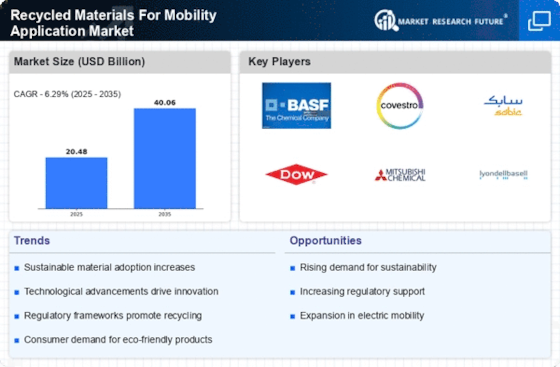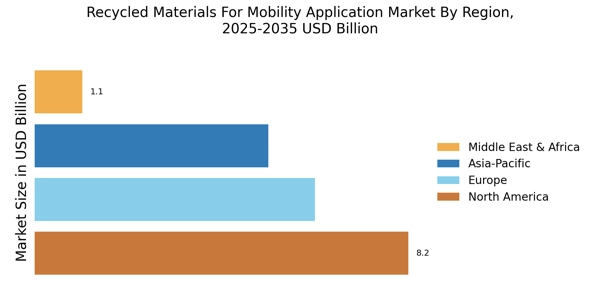Technological Innovations
Technological innovations play a crucial role in shaping the Recycled Materials For Mobility Application Market. Advances in recycling technologies have significantly improved the efficiency and quality of recycled materials, making them more viable for use in mobility applications. For example, innovations in material processing and separation techniques have enhanced the purity of recycled inputs, which is essential for maintaining performance standards in automotive and aerospace sectors. Furthermore, the development of new composite materials that incorporate recycled content is gaining traction, potentially leading to lighter and more durable products. This trend suggests that as technology continues to evolve, the market for recycled materials will expand, driven by the need for high-performance, sustainable alternatives in mobility solutions.
Sustainability Regulations
The increasing emphasis on sustainability regulations is a pivotal driver for the Recycled Materials For Mobility Application Market. Governments and regulatory bodies are implementing stringent policies aimed at reducing waste and promoting recycling. For instance, many regions have set ambitious targets for recycling rates, which directly influences the demand for recycled materials in mobility applications. This regulatory landscape encourages manufacturers to adopt recycled materials, thereby fostering innovation and investment in sustainable practices. As a result, the market is likely to witness a surge in the utilization of recycled materials, aligning with both environmental goals and economic incentives. The integration of recycled materials not only aids in compliance with regulations but also enhances the overall sustainability profile of mobility products, making them more appealing to environmentally conscious consumers.
Economic Benefits of Recycling
The economic benefits associated with recycling are a compelling driver for the Recycled Materials For Mobility Application Market. Utilizing recycled materials can lead to significant cost savings for manufacturers, as the production of recycled inputs often requires less energy and fewer resources compared to virgin materials. This economic advantage is particularly relevant in the mobility sector, where material costs can substantially impact overall production expenses. Additionally, the recycling industry contributes to job creation and economic growth, further reinforcing its importance. As companies recognize the financial incentives of adopting recycled materials, the market is likely to experience increased investment and innovation, ultimately leading to a more robust and sustainable mobility application landscape.
Corporate Sustainability Initiatives
Corporate sustainability initiatives are increasingly influencing the Recycled Materials For Mobility Application Market. Many companies are adopting comprehensive sustainability strategies that prioritize the use of recycled materials in their products. This trend is driven by a combination of regulatory pressures, consumer expectations, and the desire to enhance corporate reputation. By committing to sustainability, companies not only reduce their environmental footprint but also position themselves as leaders in the market. The integration of recycled materials into mobility applications is often highlighted in corporate sustainability reports, showcasing a commitment to responsible sourcing and environmental stewardship. As more companies embrace these initiatives, the demand for recycled materials is expected to rise, fostering a more sustainable future for the mobility sector.
Consumer Demand for Eco-Friendly Products
The growing consumer demand for eco-friendly products is a significant driver for the Recycled Materials For Mobility Application Market. As awareness of environmental issues increases, consumers are increasingly seeking products that reflect their values, including sustainability and responsible sourcing. This shift in consumer preferences is prompting manufacturers to incorporate recycled materials into their offerings, particularly in the automotive and transportation sectors. Market data indicates that a substantial percentage of consumers are willing to pay a premium for products made from recycled materials, which further incentivizes companies to invest in sustainable practices. Consequently, the integration of recycled materials not only meets consumer expectations but also enhances brand loyalty and market competitiveness.

















